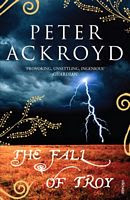Different, in terms of style, from 'Hawksmoor' and 'The House of Doctor Dee'. A German archaeologist's belief that he has discovered Troy. Herr Obermann, lives in an imaginary world where everything is connected, in some way, to Troy. He is convinced that he has discovered the lost city and will do anything to 'keep it this way' - even murder those who dare to contradict him.
Sophia Chrysanthis is initially dazzled when the famous German archaeologist, Obermann comes in search of a Greek bride who can read the works of Homer and assist in his excavations of the city he believes is Ancient Troy. But Obermann's past turns out to be full of skeletons and when a young American arrives to question the archaeologist's methods and dies of a mysterious fever, Sophia wonders just how far he will go to protect his vision of Troy. Soon a second, British, archaeologist arrives (sent by the British Museum) and he falls in love with Sophia...
The story takes another turn when Sophia discovers that Obermann was already married and that his wife is mad.
"I cannot wait to bring you to the plain of Troy. To show you the place where Hector and Achilles fought. To show you the palace of Priam. And the walls where the Trojan women watched their warriors in battle with the invader. It will stir your blood, Sophia.”
" 'You will be Artemis disguised as a mortal woman, stepping in a bright cloud among the people.'
'I hardly think so. We are all mortal.'
'Never say it, Sophia. We are gods in our ambitions.' "
"Let me show you something. Do you see this sequence of signs? They meant nothing to me at first, but then I identified seven separate variants.'
'Seven separate case forms?'
'Precisely. What does that mean to you?'
'I am a man of earth and stone, Mr Thornton. I cannot follow your speculations.'
'They are identical with ancient Sanskrit. And do you see this? These two separate signs are placed at the ends of many words. I believe them to signify tenses. I have interpreted them as ya and tva. Do you know what they are, Herr Obermann?'
'You tell me.'
'Ancient Sanskrit.' Obermann looked at him impassively.
'Do you not see? The Trojans spoke the language of the ancient Vedas. They are the people of the Rigveda and the Samaveda!'
'Impossible, sir. Preposterous. They were Greek not Indian.' "

Niciun comentariu:
Trimiteți un comentariu